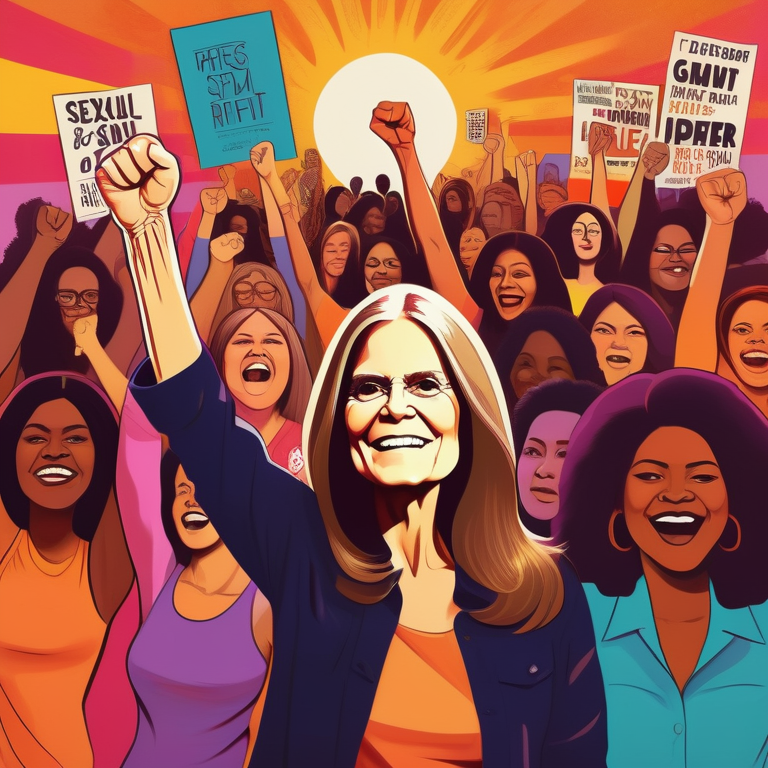The Influence of Gloria Steinem on Women’s Sexual Liberation

Key Highlights
- Gloria Steinem emerged as a key leader in the second-wave feminism movement in the late 1960s and early 1970s.
- She co-founded Ms. magazine, which became a pivotal platform for feminist discourse and activism.
- Steinem challenged societal norms regarding women’s sexuality through her writings and activism, advocating for reproductive freedom and equal rights.
- She broke barriers in journalism, including her undercover experience as a Playboy Bunny, shedding light on the objectification of women.
- Steinem’s political activism and advocacy for women’s rights paved the way for legislative changes and advancements in gender equality.
- Her theories on feminism and collaborations with other movements further contributed to women’s sexual liberation and social justice.
Introduction
Gloria Steinem, born on March 25, 1934, in Toledo, Ohio, is an American journalist and social-political activist who has had a profound impact on women’s sexual liberation. She emerged as a prominent leader during the second-wave feminism movement in the late 1960s and early 1970s. Steinem’s unwavering commitment to challenging societal norms and advocating for women’s rights has made her an iconic figure in the fight for gender equality and a well-known media spokeswoman on issues of equality. Her work as a journalist during the 1960s, including her coverage of a public hearing on abortion, was the turning point that propelled her towards the women’s movement, ultimately becoming a key figure in the women’s movement. Today, Steinem’s contributions to the women’s movement continue to inspire and empower women around the world.
One of Steinem’s significant contributions to women’s sexual liberation is her co-founding of Ms. magazine in 1972, a groundbreaking publication that provided a platform for feminist discourse and activism. Through Ms. magazine, Steinem and her colleagues tackled a wide range of issues, including breast cancer, reproductive rights, gender roles, and workplace discrimination. The magazine became a vital resource for women seeking information, empowerment, and a sense of community, and in 1986, Steinem explored the impact and criticism surrounding one of America’s most iconic women in the book Marilyn: Norma Jean, about Marilyn Monroe. She also became a consulting editor at Ms. magazine the following year after the publication was sold to an Australian company. In an oral history of Ms. magazine, Steinem’s influence and contributions are highlighted and celebrated by those who worked with her.
Steinem’s journey towards becoming a feminist icon began with her early life and education. She attended Smith College, where she became involved in student activism and developed a passion for social justice. After college, she received a Chester Bowles Fellowship, which allowed her to spend two years in India, where she further explored feminist ideas and became influenced by Mahatma Gandhi’s principles of nonviolent resistance.
Throughout her career, Steinem has been a trailblazer in journalism, breaking barriers and challenging the status quo. She worked as a freelance writer for publications such as New York magazine and The New York Times, using her platform to shed light on important feminist issues. Steinem’s experience as an undercover Playboy Bunny at the Playboy Club in 1963 became a powerful exposé, published in Show magazine, highlighting the objectification and mistreatment of women.
Steinem’s activism extended beyond journalism. She co-founded the National Women’s Political Caucus in 1971, providing training and support for women seeking elected and appointed government positions. She also played a crucial role in advocating for the passage of the Equal Rights Amendment and fighting for reproductive freedom. Steinem’s theories on feminism and collaborations with other movements, such as the LGBTQ+ community, further contributed to women’s sexual liberation and social justice. Additionally, her work with the National Women’s Political Caucus, founded by Steinem and other feminist leaders including Congresswoman Bella Abzug, Congresswoman Shirley Chisholm, and feminist Betty Friedan, continues to pave the way for more pro-equality women in elected and appointed offices at both the national and state levels, making it a crucial organization in the fight for gender equality and a key player in the national women’s political caucus. Choice USA, co-founded by Steinem in 1992, also plays a vital role in the ongoing support and mobilization of the younger generation in advocating for reproductive choice and women’s rights.
Today, Gloria Steinem’s legacy continues to inspire and empower women around the world. Her tireless advocacy and groundbreaking work have paved the way for significant advancements in women’s rights and continue to shape the ongoing fight for gender equality. In this blog, we will explore the influential milestones of Steinem’s career and the profound impact she has had on women’s sexual liberation, including her co-founding of the Women’s Media Center in 2005.
The Roots of Revolution: Gloria Steinem’s Early Life
Gloria Steinem was born on March 25, 1934, in Toledo, Ohio. Her early life and education, including her paternal grandmother’s influence, played a significant role in shaping her feminist beliefs and activism. Steinem attended Smith College, where she became involved in student activism and developed a passion for social justice. After college, she received a Chester Bowles Fellowship, which allowed her to spend two years in India, further exploring feminist ideas and becoming influenced by Mahatma Gandhi’s principles of nonviolent resistance. She also co-founded the National Women’s Political Caucus in 1971 with fellow feminists Betty Friedan, Bella Abzug, and Shirley Chisholm. It wasn’t until she was 66 years old that Steinem married for the first time in a Cherokee ceremony in Oklahoma, showing her commitment to breaking societal norms and challenging traditional gender roles. Steinem currently lives in New York’s Upper East Side, where she continues to advocate for women’s rights and social justice, inspired by her close friend and fellow activist, Wilma Mankiller.
The Making of a Feminist Icon
Steinem’s journey towards becoming a feminist icon can be traced back to her experiences in high school and her time at Smith College. She excelled academically and was inducted into the prestigious Phi Beta Kappa honor society. However, it was during her college years that she began to question traditional gender roles and the inequality faced by women.
After college, Steinem embarked on a career in journalism, writing for various publications and gaining recognition for her insightful and thought-provoking articles. She became known for her sharp wit, intellect, and unwavering commitment to women’s rights. Steinem’s work as a journalist in the late 1950s allowed her to use her platform to shed light on important feminist issues and challenge societal norms.
In her personal life, Steinem has had a significant impact as a mentor and role model. She became stepmother to Christian Bale, the son of her late husband David Bale. Her influence and guidance have extended to younger generations, inspiring young girls and women to stand up for their rights and fight for gender equality.
Educational Journey and Its Impact
Steinem’s educational journey at Smith College and Simmons College, where she lived with her older sister, had a profound impact on her feminist beliefs and activism. At Smith, she became involved in student activism and developed a deep passion for social justice. Her experiences at both colleges shaped her understanding of gender inequality and inspired her commitment to fight for women’s rights.
After college, Steinem received the prestigious Chester Bowles Fellowship, which allowed her to spend two years in India. During this time, she further explored feminist ideas and was influenced by Mahatma Gandhi’s philosophy of nonviolent resistance. The fellowship provided Steinem with a unique opportunity to immerse herself in a different culture and gain a global perspective on women’s rights. Upon returning to the United States, she served as director of the Independent Research Service, an organization funded in secret by a donor that turned out to be the CIA. This experience, along with her close friendship and partnership with activist Dorothy Pitman Hughes, would have a significant impact on her later activism and advocacy for women’s rights.
Steinem’s educational journey at Smith College and her time in India laid the foundation for her future activism. They provided her with the knowledge, insights, and determination necessary to challenge societal norms and advocate for women’s sexual liberation. These experiences shaped her into the feminist icon she is today.
Breaking Barriers: Steinem’s Entry into Journalism
Entering the field of journalism marked a significant turning point in Gloria Steinem’s career. She began her writing career as a freelance writer, contributing to various publications. Her talent and unique perspective quickly gained attention, leading to opportunities with prominent media outlets.
One of Steinem’s notable accomplishments was her work at New York magazine, where she served as a columnist. Her articles covered a wide range of topics, including women’s rights, politics, and social issues. Steinem’s sharp and insightful writing style captivated readers and established her as a prominent voice in the feminist movement.
Steinem’s freelance work and contributions to New York magazine allowed her to reach a wider audience and shed light on important feminist issues. Her work as a journalist set the stage for her future activism and advocacy for women’s sexual liberation.
Challenging the Status Quo through Writing
Steinem’s writing played a pivotal role in challenging the status quo and advocating for women’s rights. Her articles tackled a wide range of topics, addressing issues such as reproductive rights, gender inequality, and workplace discrimination.
As a political activist, Steinem used her platform as a writer to shed light on important feminist issues. Her writings in publications like the New York Times garnered national attention and positioned her as a feminist leader. Steinem’s ability to articulate complex ideas in a relatable and thought-provoking manner made her work accessible to a wide audience.
Through her writing, Steinem became a powerful voice for women’s sexual liberation and social justice. Her articles encouraged critical thinking, sparked conversations, and inspired individuals to challenge societal norms and fight for gender equality.
The Undercover Playboy Bunny Experience
One of the most controversial experiences of Gloria Steinem’s career was her time undercover as a Playboy Bunny at the Playboy Club in 1963. Steinem took on this assignment to gain firsthand knowledge of the objectification and mistreatment of women in the entertainment industry.
Her experience as a Playboy Bunny exposed the exploitative working conditions and the pervasive sexism within the New York Playboy Club. Steinem’s article, “A Bunny’s Tale,” published in 1963, shed light on the demeaning treatment of women and sparked a national conversation about women’s rights, journalism, and the objectification of women in popular culture, all thanks to her undercover work as a Bunny in Hugh Hefner’s club.
Steinem’s undercover work at the Playboy Club was a significant turning point in her career. It solidified her commitment to feminist activism and became a catalyst for her future writings and advocacy for women’s sexual liberation.
Feminism and Sexual Liberation: Key Milestones
Gloria Steinem’s contributions to feminism and women’s sexual liberation can be observed through key milestones in her career. These milestones include her co-founding of Ms. magazine and the National Women’s Political Caucus.
Ms. magazine, co-founded by Steinem in 1972, became a transformative platform for feminist discourse and activism. The magazine tackled a wide range of issues, from reproductive rights to workplace discrimination, empowering women and challenging societal norms.
The National Women’s Political Caucus, co-founded by Steinem in 1971, provided training and support for women seeking elected and appointed offices in government. This organization became instrumental in advancing feminist causes and legislation.
Through these milestones, Steinem played a pivotal role in shaping feminist discourse and advocating for women’s sexual liberation. Her dedication to gender equality and women’s rights continues to inspire and empower women worldwide.
Co-founding Ms. Magazine
One of Gloria Steinem’s most significant contributions to feminism was her co-founding of Ms. magazine in 1972. The magazine was revolutionary in its approach and became a vital platform for feminist discourse and activism.
Alongside co-founder Letty Cottin Pogrebin, Steinem launched Ms. magazine with the goal of providing a voice for women and addressing the pressing issues they faced. The magazine covered a wide range of topics, including reproductive rights, gender equality, and workplace discrimination.
Ms. magazine quickly gained national attention and became a powerful tool for educating, inspiring, and empowering women. It provided a space for women to share their stories, express their opinions, and connect with a larger community of feminists.
Through the creation of Ms. magazine, Steinem and Pogrebin made a lasting impact on the feminist movement. The magazine continues to be published today and remains a vital resource for women seeking information, empowerment, and a sense of community.
The Infamous Address to the Women of America
Steinem’s influential career as a feminist leader is highlighted by her famous address to the Women of America at the National Women’s Political Caucus in 1971. In her speech, Steinem passionately advocated for women’s rights and laid out her vision for a society based on equality and social justice.
The address, delivered alongside prominent feminist Bella Abzug, resonated with women across the nation and positioned Steinem as a feminist leader. Her powerful words and unwavering commitment to women’s rights inspired a new wave of feminist activism.
Steinem’s address to the Women of America encapsulated the essence of her feminist beliefs and the urgency of the fight for gender equality. It became a defining moment in her career and solidified her role as a prominent voice in the feminist movement.
Political Activism and Its Influence on Women’s Rights
Gloria Steinem’s political activism played a crucial role in advancing women’s rights and promoting gender equality. Her involvement in various campaigns and advocacy efforts helped shape legislative changes and create greater awareness around women’s issues.
Steinem actively campaigned for civil rights and equal rights throughout her career. She was a strong advocate for the passage of the Equal Rights Amendment, which aimed to guarantee gender equality under the law. Her work with the National Women’s Political Caucus also provided training and support for women seeking elected and appointed offices in government.
Through her political activism, Steinem helped bring attention to the challenges faced by women, promoting societal change and legislative reforms. Her contributions continue to resonate in the ongoing fight for women’s rights and gender equality.
Campaigns and Political Advocacy
Steinem’s political activism extended beyond her role in co-founding the National Women’s Political Caucus. She actively campaigned and advocated for women’s rights through various initiatives and organizations.
Through her involvement in political campaigns, Steinem sought to increase awareness of women’s issues and promote gender equality. She tirelessly advocated for the passage of the Equal Rights Amendment, which aimed to ensure equal rights for women under the law.
Steinem’s political advocacy played a crucial role in shaping public opinion and influencing legislative changes. Her efforts helped raise awareness about the challenges faced by women and the need for equal rights.
Through her campaigns and political advocacy, Steinem worked to create a more inclusive and equal society. Her contributions have had a lasting impact on women’s rights and continue to inspire future generations of activists.
Legislative Changes and Their Impact
Gloria Steinem’s advocacy for legislative changes has played a significant role in advancing women’s rights and promoting gender equality. Her work has had a lasting impact on the legal landscape and societal attitudes towards women’s issues.
Steinem’s advocacy for the passage of the Equal Rights Amendment (ERA) was instrumental in raising awareness about the need for constitutional protection of women’s rights. Although the ERA was not ratified by the required number of states, the movement sparked important conversations and led to significant legal changes at the state level.
Steinem’s influence and activism have also extended to the Supreme Court, where landmark decisions have shaped women’s rights. The Court’s rulings on reproductive rights, workplace discrimination, and gender equality have been influenced by the efforts of advocates like Steinem.
Through her advocacy for legislative changes, Steinem has helped create a more equitable and just society for women. Her legacy continues to inspire and empower future generations of activists.
Steinem’s Theories and Their Contribution to Feminism
Gloria Steinem’s theories on feminism have made significant contributions to the movement and have shaped the discourse around women’s rights. Her writings and activism have challenged traditional notions of gender, advocated for reproductive freedom, and expanded the boundaries of gender equality.
Steinem redefined feminist theory by highlighting the intersecting struggles faced by women and the importance of social justice. She emphasized the need for reproductive freedom, recognizing that control over one’s reproductive choices is essential for women’s autonomy and equality.
By pushing the boundaries of gender norms and advocating for reproductive rights, Steinem has contributed to a more inclusive and expansive feminist movement. Her theories have sparked important discussions and propelled the fight for gender equality forward.
Redefining Feminist Theory
Gloria Steinem’s redefinition of feminist theory has been instrumental in shaping the feminist movement and advancing women’s rights. Her theories challenged traditional notions of gender and emphasized the importance of social justice.
Steinem was actively involved in the radical feminist group, which sought to address the root causes of gender inequality and promote social change. Through her involvement with this group, she deepened her understanding of the interconnectedness of various social justice movements.
Steinem’s theories emphasized the need for intersectionality, recognizing that the fight for gender equality is intertwined with other struggles for justice and equity. Her work paved the way for a more inclusive and intersectional feminism that acknowledges and addresses the unique challenges faced by different groups of women.
By redefining feminist theory and emphasizing the importance of social justice, Steinem has made significant contributions to the feminist movement. Her ideas continue to inspire and shape the ongoing fight for gender equality.
The Importance of Reproductive Freedom
Reproductive freedom has been a central focus of Gloria Steinem’s activism and theories on feminism. She has emphasized the importance of reproductive rights as a fundamental aspect of women’s autonomy and equality.
Steinem recognized that control over one’s reproductive choices is essential for women to have full agency over their lives. She has been a vocal advocate for organizations like Planned Parenthood, which provide essential reproductive healthcare services and support.
Through her writings and activism, Steinem has worked to destigmatize discussions around reproductive freedom and challenge the efforts to restrict access to reproductive healthcare. She has emphasized the need for comprehensive reproductive healthcare, including access to contraception, safe and legal abortion, and comprehensive sex education.
Steinem’s advocacy for reproductive freedom continues to shape the discourse around women’s rights and influence policies that impact women’s access to reproductive healthcare.
Collaborations and Support for Other Movements
Gloria Steinem’s activism extended beyond feminism, as she actively collaborated with and supported other social justice movements. She recognized the importance of intersectionality and the interconnectedness of various struggles for equality.
Steinem’s collaborations with other movements, such as the civil rights movement and LGBTQ+ activism, helped forge alliances and create a more inclusive understanding of social justice. She understood that the fight for gender equality is intertwined with other struggles for justice and equity.
By supporting and working alongside other social justice movements, Steinem contributed to a more intersectional and interconnected approach to activism. Her commitment to social justice and inclusivity has had a lasting impact on the feminist movement and beyond.
Intersectionality in Steinem’s Activism
Gloria Steinem’s activism has been deeply rooted in intersectionality, recognizing the interconnectedness of various social justice movements. She actively supported and collaborated with the civil rights movement, understanding the importance of solidarity in fighting for justice and equality.
Steinem’s work at the intersection of feminism and civil rights highlighted the shared struggles faced by different marginalized groups. She emphasized the need for a more inclusive and intersectional approach to activism, recognizing that gender equality is intertwined with racial, economic, and social justice.
Through her advocacy and collaborations, Steinem helped bridge gaps and build alliances between different social justice movements. Her commitment to intersectionality has had a profound impact on the feminist movement and continues to shape efforts for social change.
Solidarity with the LGBTQ+ Community
Gloria Steinem has been a staunch ally of the LGBTQ+ community and has actively supported LGBTQ+ rights throughout her career. She recognized the importance of solidarity and inclusivity in the fight for social justice.
Steinem’s advocacy for LGBTQ+ rights stemmed from her belief in the interconnectedness of all struggles for equality. She understood that gender equality includes the rights and experiences of individuals across the LGBTQ+ spectrum.
Through her writings, activism, and public support, Steinem has helped raise awareness about LGBTQ+ issues and promote inclusivity within the feminist movement. Her work has contributed to a more inclusive and intersectional understanding of social justice.
Steinem’s solidarity with the LGBTQ+ community continues to inspire and shape efforts for equality and acceptance. Her commitment to social justice extends to all individuals fighting for their rights and dignity.
Steinem’s Legacy and Continued Relevance
Gloria Steinem’s legacy as a feminist icon and advocate for women’s sexual liberation continues to be revered and celebrated. Her contributions to the feminist movement have had a lasting impact on society and continue to shape the ongoing fight for gender equality.
Steinem’s influential work has been recognized with numerous awards and honors, including the Presidential Medal of Freedom and the establishment of the Gloria Steinem Endowed Chair in Media, Culture, and Feminist Studies at Rutgers University.
Her legacy extends beyond accolades, as she continues to inspire and mentor new generations of feminists. Steinem’s unwavering dedication to equality and social justice remains as relevant today as it was during the height of her activism.
Awards and Recognitions
Gloria Steinem’s contributions to the feminist movement and her tireless advocacy for women’s rights have been recognized with numerous awards and honors. These accolades reflect the significant impact she has had on society and the ongoing fight for gender equality.
One of the most prestigious honors Steinem has received is the Presidential Medal of Freedom, which she was awarded in 2013. The Presidential Medal of Freedom is the highest civilian honor in the United States and is presented to individuals who have made exceptional contributions to society.
Steinem’s legacy is also celebrated through the establishment of the Gloria Steinem Endowed Chair in Media, Culture, and Feminist Studies at Rutgers University. This chair recognizes her ongoing influence and provides a platform for continued research and education on issues of gender equality.
These awards and recognitions highlight the profound impact Gloria Steinem has had on the feminist movement and her enduring legacy as a champion for women’s rights.
Mentorship and Influence on New Generations
Gloria Steinem’s mentorship and influence on new generations of feminists have been instrumental in shaping the future of the feminist movement. Through her writings, speeches, and personal interactions, she has inspired countless individuals to stand up for their rights and fight for gender equality.
Steinem’s commitment to mentorship is evident in her support of young girls and aspiring feminists. Her establishment of the Gloria Steinem Endowed Chair in Media, Culture, and Feminist Studies at Rutgers University provides a platform for educating and empowering future generations of activists.
Steinem’s mentorship goes beyond academia. She actively engages with young feminists, offering guidance and support. Her willingness to share her experiences and wisdom has helped cultivate a new generation of leaders in the fight for gender equality.
Through her mentorship and influence, Steinem ensures that her legacy continues to thrive, empowering young girls and inspiring future generations to continue the fight for women’s rights.
Conclusion
Gloria Steinem’s trailblazing journey has left an indelible mark on women’s sexual liberation and equality. From her groundbreaking work in journalism to her fierce advocacy for reproductive freedom, Steinem’s legacy continues to inspire generations. Her unwavering commitment to challenging societal norms and empowering women reverberates through her iconic co-founding of Ms. Magazine and pivotal political activism. Today, we honor her enduring impact on feminism, intersectionality, and LGBTQ+ rights. Celebrate Gloria Steinem’s extraordinary contributions by sharing her story on social media and perpetuating her message of empowerment and equality.
Frequently Asked Questions
How did Gloria Steinem contribute to women’s sexual liberation?
Gloria Steinem contributed to women’s sexual liberation through her writings, activism, and advocacy for reproductive freedom and women’s rights. She challenged societal norms, advocated for gender equality, and emphasized the importance of reproductive autonomy and sexual liberation.
What are some of Steinem’s most influential works?
Some of Gloria Steinem’s most influential works include her books “Outrageous Acts and Everyday Rebellions” and “The Education of a Woman.” She also co-founded Ms. magazine, which became a prominent platform for feminist discourse and activism.
In what ways did Gloria Steinem challenge societal norms regarding women’s sexuality?
Gloria Steinem challenged societal norms regarding women’s sexuality through her undercover work as a Playboy Bunny, shedding light on the objectification and mistreatment of women. She also addressed issues such as sexual harassment and gender roles through her writings and activism.
What is the lasting legacy of Gloria Steinem in the realm of women’s sexual liberation?
Gloria Steinem’s lasting legacy in the realm of women’s sexual liberation is her unwavering commitment to women’s rights and gender equality. Her writings, activism, and advocacy for reproductive freedom have inspired and empowered women around the world, shaping the ongoing fight for gender equality.





